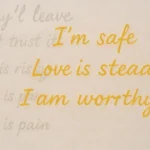From People-Pleaser to Empowered: Unsent Letters & a Tapping Guide to Setting Healthy Boundaries
With insights from Deborah Serani, Psychologist & Author of Living With Depression
Letter One: To the Friend I Couldn’t Say No To
It was already dark outside. My kitchen smelled faintly of burnt toast from dinner I hadn’t finished, my phone face-down on the counter so I wouldn’t be tempted to check it. It still lit up. Hey, any chance you could help me with that report tonight?
I didn’t even look at the clock. My thumbs were already moving. “Of course,” with a smiley face — the mask I can apply in under a second. But my body betrayed me. My shoulders curled inward. My lungs tightened, breath shallow. My stomach felt heavy, like I’d just swallowed something that didn’t belong there. You wouldn’t have seen it. You would have heard the lightness in my tone if we’d been speaking. But you wouldn’t have heard the whisper inside me: I don’t have the energy for this. Not tonight. Not again. That whisper never wins. Not then. Not yet.
Flashback
Third grade, school pickup line. I’m in the back seat, cradling a crumpled art project in my lap. My mother’s voice is clipped: “Mrs. Carter said you wouldn’t help clean up after class? You made her day harder.” My cheeks burn. My small hands clench. I murmur, “I was tired,” but it doesn’t matter. The silence that follows is worse than shouting. It’s the kind that makes you scramble to fix things before it swallows you. The next day, I clean the classroom until my fingers smell like bleach. Mrs. Carter smiles. My mother smiles. My chest loosens. Lesson learned.
Dr. Serani’s note: “This is the hidden tax of people-pleasing — paid in guilt, quiet resentment, and the erosion of self-worth. It often feels safer to say yes than to face possible disconnection. But each yes given from fear chips away at your sense of self.”
Tapping for the “Automatic Yes” Reflex
Setup (Karate Chop):
- “Even though my body says yes before my heart has a chance to answer, I honor how hard I’ve worked to feel safe and accepted.”
- “Even though I’ve been trained to keep the peace at my own expense, I’m open to the idea that my needs matter too.”
Sequence:
- Eyebrow: “This reflex to please without thinking.”
- Side of Eye: “Afraid of the silence if I say no.”
- Under Eye: “The knot in my stomach when I imagine disappointing them.”
- Under Nose: “Old guilt, living in my nervous system.”
- Chin: “I’ve been doing this for so long.”
- Collarbone: “I’m allowed to pause before I answer.”
- Under Arm: “It’s safe to check in with myself.”
- Top of Head: “I’m learning to answer from truth, not fear.”
Letter Two: To the Moment I Imagined You Turning Away
It starts before I speak. Before I even decide. In my mind, I can already see it — your eyebrows lift, the pause in your voice, maybe the faint sigh. The shift of your body like you’re quietly stepping back. And in that instant, a whole story unspools: you’ll think I’m unreliable. You’ll tell someone. You’ll slowly stop calling. The space between us will widen until it’s permanent. The thought of that space makes my chest hurt more than the exhaustion of saying yes. So I give you what you want — not because I have it to give, but because I can’t stand the thought of you pulling away.
Flashback
Middle school cafeteria, 7th grade. I’m halfway through my sandwich when a classmate says, “Can I have that?” He points to my cookie — the one my dad packed because it’s my favorite. I hesitate. He tilts his head. “Come on. I’ll be your friend.” The words land like a hook. I give it to him. He smiles, calls me “cool,” and I’m warm all over. The next day, he doesn’t sit with me. But the lesson lingers: giving keeps people close, even if only for a moment.
Dr. Serani’s note: “Fear of disappointing others is often rooted in early attachment experiences. If love or approval felt conditional, saying no can feel like risking abandonment. But healthy relationships survive — and even thrive — when you can express your limits.”
Tapping for Fear of Disappointing Others
Setup (Karate Chop):
- “Even though I’m terrified of letting people down, I accept that this fear once kept me safe.”
- “Even though I feel panic at the thought of being seen as selfish, I choose to respect myself enough to pause.”
Sequence:
- Eyebrow: “This fear of being rejected.”
- Side of Eye: “Worried they’ll think less of me.”
- Under Eye: “Feeling responsible for everyone’s happiness.”
- Under Nose: “Carrying weight that isn’t mine.”
- Chin: “I don’t want to be the bad one.”
- Collarbone: “I want to feel safe in my no.”
- Under Arm: “Letting go of this ancient panic.”
- Top of Head: “It’s okay to choose myself.”
Letter Three: To the Space I Never Guarded
I thought being open meant being good. I pictured walls as cold things, and I didn’t want to be cold. So I left the gates wide open. People came and went. At first, I liked it. I told myself it meant I was generous. But slowly, the ground wore thin. My own grass stopped growing. The flowers I planted wilted because they were always being stepped on. I couldn’t hear my own thoughts over the constant movement of other people’s needs.
Flashback
First apartment, age 21. Friday night. I’m exhausted from work, dreaming of a quiet night alone. My roommate asks if I can cover her shift so she can go out. I want to say no. I can almost taste it. But my brain says, She’ll think I’m selfish. She’ll stop liking me. I say yes. I stay until midnight, cleaning up after strangers. She comes home drunk and laughing. I tell myself it was worth it. My body knows otherwise.
Dr. Serani’s note: “Boundaries are living agreements that protect connection and prevent resentment. Without them, you risk giving so much of yourself that nothing authentic remains.”
Tapping for the “Boundaries Are Mean” Belief
Setup (Karate Chop):
- “Even though I’ve been told boundaries are selfish, I honor my right to protect my energy.”
- “Even though part of me fears boundaries will push people away, I’m open to believing they can create deeper connection.”
Sequence:
- Eyebrow: “This belief that saying no makes me unkind.”
- Side of Eye: “Worried they’ll see me differently.”
- Under Eye: “That voice saying, ‘You should just help.’”
- Under Nose: “The pressure to be endlessly available.”
- Chin: “I’m allowed to choose my limits.”
- Collarbone: “Boundaries protect my relationships.”
- Under Arm: “It’s safe to value my own well-being.”
- Top of Head: “I can be kind and still say no.”
Final Letter: To Myself
I have been missing from my own life. For years, I measured my worth by how well I erased myself for someone else’s comfort. I let my no be swallowed. I let my yes be stolen. But I am here now. I am learning to hear my own voice again — not the one smoothed for approval, but the one that comes from the center of my chest, steady and clear. My no is not rejection. My yes is not automatic. Both are mine. And both are worthy.
Closing Scene: The Gate
It’s early morning. Light seeps in through the thin curtains, brushing gold across the floorboards. The phone is on the nightstand. Face down. Silent. It’s been there since last night. You didn’t touch it. You sit up slowly, feeling the stretch in your spine. Your breath is full, not clipped. For the first time in a long time, there’s no tight band around your chest.
In your mind, you see it: the open field you’ve been writing about in these unsent letters. The one where you once let everyone pass through without pause. Now there’s a gate. It’s not tall or heavy. Just enough to mark the line between out there and in here. You stand beside it. One hand rests on the latch. The hinges swing smoothly. You can open it, you can close it — both without fear. Somewhere in the distance, you hear that familiar whisper, the one that’s been with you since childhood, telling you that closing the gate is selfish. But it’s softer now. Almost like it’s coming from the next field over. You take a slow breath, feeling your feet on solid ground. The gate stays closed. Not forever. Just for now. And for the first time, that feels like freedom.



